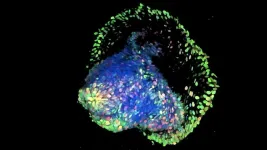(Press-News.org) Barcelona, Spain: Patients with advanced bladder cancer that had spread to other parts of the body (metastasised) have responded well in a phase I clinical trial of an investigational drug, TYRA-300. The drug targets changes in the FGFR3 gene that drive tumour growth in about 10%-20% of these patients.
Associate Professor, Ben Tran, a medical oncologist at Peter McCallum Cancer Centre in Melbourne, Australia, presented the first results as of 15 August 2024 from 41 patients enrolled in the SURF301 study in a late-breaking oral presentation at the 36th EORTC-NCI-AACR [1] Symposium on Molecular Targets and Cancer Therapeutics in Barcelona, Spain.
He told the meeting that in patients with metastatic bladder cancer with FGFR3 mutations, whose cancer had progressed on previous treatments, he and his colleagues saw positive results regarding the overall response rate (the proportion of patients whose tumours shrink – a partial response – or becomes undetectable – a complete response) to TYRA-300, the disease control rate (the proportion of patients who have a partial or complete response to the drug and stable disease) and fewer serious adverse side effects compared to other drugs that target several forms of FGFR.
Prof. Tran said: “In this first-in-human study, we saw dose dependent clinical activity in ten patients, with a 50% overall response rate and a 100% disease control rate at a dose of 90mg given orally once a day in heavily pre-treated patients with metastatic bladder cancer harbouring FGFR3 mutations. At doses of 90mg or more, once a day, there were six confirmed partial responses in 11 patients, and three of these responses are still ongoing.
“In addition, we saw improved tolerability compared to pan-FGFR inhibitors, with lower rates of significant adverse side effects, such as increased phosphate in the blood, skin and eye reactions, and diarrhoea.”
In doses ranging from 10mg to 120mg, there were four (10%) treatment-related serious adverse side effects, including one dose-limiting case of diarrhoea at 90mg, and two (5%) cases of grade 3 treatment-related increases in a liver enzyme called ALT at 90mg, which led to treatment discontinuation in one patient. There were no Grade 4 (life threatening or disabling) treatment-related side effects. The 120mg once daily dose was the highest dose evaluated with no dose-limiting toxicities reported by 15 August 2024.
The researchers also found that in all four patients with bladder cancer with FGFR3 mutations receiving the 90mg dose for whom blood samples were available, there were decreases in tumour-derived fragments of DNA (ctDNA) circulating in the blood stream. There was no sign of ctDNA in two of these patients, suggesting the cancer had been eradicated.
Prof. Tran said: “While it remains early in the development of TYRA-300, the initial clinical findings we have reported here, support the earlier pre-clinical findings: that we can inhibit FGFR3 with generally limited side effects. As the study progresses and as the development of TYRA-300 continues, we will explore TYRA-300 in different cancers, hoping to find a way to maximise the potential benefit of FGFR3 inhibition for our patients.”
In this phase I trial, as of August 15, 2024, 61% of enrolled patients have bladder (urothelial) cancer, 10% have head and neck cancers, 7% have lung cancers and 22% have other types of cancers. The results given today were for all patients enrolled in the phase I trial, who had cancers with FGFR3 mutations or fusions.
Around 8% of patients with advanced metastatic bladder cancer survive for five years or more [2]. In healthy, normal cells, Fibroblast Growth Factors (FGFs) bind to their receptors (FGFRs) to regulate cellular proliferation, migration, differentiation and survival. In cancer cells, these same FGFRs are frequently mutated so that they provide growth and proliferation signals without FGFs having to bind to the receptor. This leads to uncontrolled proliferation and tumour growth. For one of these FGFRs, FGFR3, these alterations can take the form of small changes, called mutations, or larger changes where FGFR3 is fused to another gene, called fusions, both of which can lead to uncontrolled FGFR3 activation and cancer.
Prof. Tran said: “While pan-FGFR inhibitors are available and approved for use in metastatic urothelial cancer, the known side effects of these drugs can seriously affect the quality of life of patients and, as a result, clinicians may not prescribe them despite the known improvements in response rates. TYRA-300 is a next generation investigational FGFR inhibitor, that is designed to focus solely on the FGFR3 receptor, aiming to provide the potential benefits of FGFR inhibition to patients with much fewer side effects. I have been involved in the development of FGFR inhibitors for many years and when I first saw the data for TYRA-300, I was very excited and knew I wanted to be involved in bringing TYRA-300 to our patients.”
The phase I clinical trial continues, and the researchers plan to investigate TYRA-300 in metastatic bladder cancer, non-muscle invasive bladder cancer, as well as abnormalities in bone growth known as skeletal dysplasias.
Professor Timothy A Yap from the University of Texas MD Anderson Cancer Center, Houston, USA, is co-chair of the EORTC-NCI-AACR Symposium and was not involved in the research. He said: “These first results from the phase 1 clinical trial of TYRA-300 show compelling activity in patients whose cancer has progressed despite being heavily treated with other therapies previously. The fact that TYRA-300 seems able to specifically target cancers with FGFR3 mutations or fusions, with fewer side effects than other drugs, gives us hope that patients with hard-to-treat advanced bladder and other cancers that also have FGFR3 mutations or fusions, may be able to benefit from a kinder and more effective therapy once these results have been validated in further clinical trials.”
(ends)
Abstract no: 500LBA, “Preliminary safety and anti-tumor activity of TYRA-300, a highly selective FGFR3 inhibitor, in participants with advanced solid tumors with activating FGFR3 mutations/fusions (SURF301)”, by Ben Tran, presented in plenary session 7 ‘Late breaking abstracts and proffered papers: novel discoveries in drug development’, 15:00-16:50 hrs CEST, Friday 25 October, Room 111-112.
[1] EORTC [European Organisation for Research and Treatment of Cancer, NCI [National Cancer Institute], AACR [American Association for Cancer Research]. The Symposium takes place in Barcelona from 23-25 October 2024.
[2] https://www.cancer.gov/types/bladder/survival.
END
Patients with advanced bladder cancer with alterations in the FGFR3 gene respond well to investigational drug, TYRA-300
First results from SURF301 phase I clinical trial
2024-10-24
ELSE PRESS RELEASES FROM THIS DATE:
Researchers find key genetic mutations in bowel cancer cells that lead to resistance to WRN inhibitors
2024-10-24
Barcelona, Spain: Researchers have discovered key mutations in certain cancer cells that make them resistant to WRN inhibitors, a new class of anti-cancer drugs. The yet-to-be-published findings are presented on Friday at the 36th EORTC-NCI-AACR [1] Symposium on Molecular Targets and Cancer Therapeutics in Barcelona, Spain.
Werner helicase (WRN) inhibitors are already being evaluated in phase I clinical trials in patients with tumours that have microsatellite instability (MSI) – a condition in which the genes responsible for monitoring and repairing mistakes in DNA replication stop functioning, and errors are introduced. This is also ...
Millions in the U.S. may rely on groundwater contaminated with PFAS for drinking water supplies
2024-10-24
PEMBROKE, N.H. — Approximately 71 to 95 million people in the Lower 48 states – more than 20% of the country’s population – may rely on groundwater that contains detectable concentrations of per- and polyfluoroalkyl substances, also known as PFAS, for their drinking water supplies. These findings are according to a U.S Geological Survey study published Oct. 24.
The predictive model results can help members of the public, water suppliers and regulators understand the potential for PFAS contamination, guide future studies and inform strategic planning for water resources.
USGS scientists are the first to ...
Human actions cause insect color change
2024-10-24
New Zealand’s native stoneflies have changed colour in response to human-driven environmental changes, new research shows.
Just published in the journal Science, the University of Otago study provides arguably the world’s most clear-cut case of animal evolution in response to change made by humans.
Co-author Professor Jon Waters, of the Department of Zoology, says the stonefly has become a different colour due to recent deforestation.
“In natural forested regions, a native species has evolved ‘warning’ colours that mimic those of a poisonous forest species, to trick predators into ...
New AI model could make power grids more reliable amid rising renewable energy use
2024-10-24
As renewable energy sources such as wind and solar become more widespread, managing the power grid has become increasingly complex. Researchers at the University of Virginia have developed an innovative solution: an artificial intelligence model that can address the uncertainties of renewable energy generation and electric vehicle demand, making power grids more reliable and efficient.
Multi-Fidelity Graph Neural Networks: A New AI Solution
The new model is based on multi-fidelity graph neural networks (GNNs), ...
Lurie Children’s helps train pediatricians to screen toddlers for mental health risk, with equity and ethics in mind
2024-10-24
One in five children has an identified mental health problem as early as age 3. Early detection is key to earlier intervention, and it also could prevent more severe conditions down the line, such as ADHD, depression and anxiety. Pediatric primary care is an ideal setting to conduct screening for mental health risk, given that pediatricians tend to have close, ongoing relationships with young patients and their families, and broad reach to historically marginalized communities. Since mental health screening of toddlers in primary care is uncommon, it is important to train pediatricians to do so without implicit bias and in a way that prevents unintended ...
UTEP researchers develop low-cost device that detects cancer in an hour
2024-10-24
EL PASO, Texas (Oct. 24, 2024) – Researchers at The University of Texas at El Paso have created a portable device that can detect colorectal and prostate cancer more cheaply and quickly than prevailing methods. The team believes the device may be especially helpful in developing countries, which experience higher cancer mortality rates due in part to barriers to medical diagnosis.
“Our new biochip device is low-cost — just a few dollars — and sensitive, which will make accurate disease diagnosis accessible to anyone, ...
Texas A&M physicist Kevin Kelly earns American Physical Society Early Career Award
2024-10-24
Dr. Kevin J. Kelly, an assistant professor in the Department of Physics and Astronomy at Texas A&M University and a member of the George P. and Cynthia Woods Mitchell Institute for Fundamental Physics and Astronomy, has been selected as the 2025 recipient of the American Physical Society’s Henry Primakoff Award for Early-Career Particle Physics in recognition of his contributions and promising career potential in fundamental particle physics and cosmology.
Kelly, who joined the Texas A&M faculty in 2022, works at the interface of two of the biggest outstanding mysteries in particle physics: ...
University of Maryland researcher awarded $1.8 million to study climate change’s impact on people with kidney disease
2024-10-24
Climate change is driving more extreme heat and more air pollution from wildfires, each of which put human health at risk. Now, new research funded by the federal Agency for Healthcare Research and Quality (AHRQ) and led by University of Maryland School of Public Health Professor Dr. Amir Sapkota, will study how these hazards independently and jointly impact already vulnerable groups, such as people living with end stage kidney disease (ESKD). The researchers aim to identify preventative solutions.
“During extreme heat, the damaged kidneys of people with ESKD do not regulate fluid levels very ...
Johns Hopkins Children’s Center research in mice suggests zinc supplements have potential value to directly treat short bowel syndrome
2024-10-24
Researchers from Johns Hopkins Children’s Center say they have identified a gene pathway involving the mineral zinc in mice that may someday point the way to using zinc-based supplements to directly help people with a rare disorder called short bowel syndrome (SBS).
The findings, published Oct. 7 in Nature Communications, help advance efforts toward more effective, potential treatment regimens for both children and adults with the debilitating condition.
SBS, which affects 10,000–20,000 adults and children in the United States, is marked by damage to and shortening of ...
Kalinin receives David Adler Lectureship Award
2024-10-24
Sergei Kalinin, a professor in the Department of Materials Science and Engineering, has been named the winner of the David Adler Lectureship Award in the Field of Materials Physics by the American Physical Society. The award recognizes one outstanding contributor in the field of materials physics who is notable for high-quality research, review articles, and lecturing.
“I am deeply honored to receive the Adler Award, as it recognizes the critical transition in materials discovery that my colleagues at the University of Tennessee and Pacific Northwest National Laboratory and I have championed,” ...
LAST 30 PRESS RELEASES:
Scientists show how to predict world’s deadly scorpion hotspots
ASU researchers to lead AAAS panel on water insecurity in the United States
ASU professor Anne Stone to present at AAAS Conference in Phoenix on ancient origins of modern disease
Proposals for exploring viruses and skin as the next experimental quantum frontiers share US$30,000 science award
ASU researchers showcase scalable tech solutions for older adults living alone with cognitive decline at AAAS 2026
Scientists identify smooth regional trends in fruit fly survival strategies
Antipathy toward snakes? Your parents likely talked you into that at an early age
Sylvester Cancer Tip Sheet for Feb. 2026
Online exposure to medical misinformation concentrated among older adults
Telehealth improves access to genetic services for adult survivors of childhood cancers
Outdated mortality benchmarks risk missing early signs of famine and delay recognizing mass starvation
Newly discovered bacterium converts carbon dioxide into chemicals using electricity
Flipping and reversing mini-proteins could improve disease treatment
Scientists reveal major hidden source of atmospheric nitrogen pollution in fragile lake basin
Biochar emerges as a powerful tool for soil carbon neutrality and climate mitigation
Tiny cell messengers show big promise for safer protein and gene delivery
AMS releases statement regarding the decision to rescind EPA’s 2009 Endangerment Finding
Parents’ alcohol and drug use influences their children’s consumption, research shows
Modular assembly of chiral nitrogen-bridged rings achieved by palladium-catalyzed diastereoselective and enantioselective cascade cyclization reactions
Promoting civic engagement
AMS Science Preview: Hurricane slowdown, school snow days
Deforestation in the Amazon raises the surface temperature by 3 °C during the dry season
Model more accurately maps the impact of frost on corn crops
How did humans develop sharp vision? Lab-grown retinas show likely answer
Sour grapes? Taste, experience of sour foods depends on individual consumer
At AAAS, professor Krystal Tsosie argues the future of science must be Indigenous-led
From the lab to the living room: Decoding Parkinson’s patients movements in the real world
Research advances in porous materials, as highlighted in the 2025 Nobel Prize in Chemistry
Sally C. Morton, executive vice president of ASU Knowledge Enterprise, presents a bold and practical framework for moving research from discovery to real-world impact
Biochemical parameters in patients with diabetic nephropathy versus individuals with diabetes alone, non-diabetic nephropathy, and healthy controls
[Press-News.org] Patients with advanced bladder cancer with alterations in the FGFR3 gene respond well to investigational drug, TYRA-300First results from SURF301 phase I clinical trial






